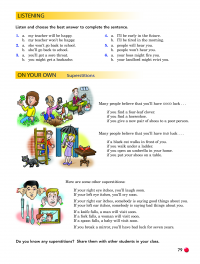



Bill Bliss
The three leaf shamrock might be a symbol of St. Patrick’s Day, but it’s the four leaf clover that will bring you good luck if you’re fortunate to find one and make a wish on it. This enchanting superstition from Ireland is part of a rich mosaic of worldwide traditions and customs for making wishes. It is also a wonderful context for practicing the grammar of conditionals and for stimulating some fun cross-cultural sharing as students crowd-source superstitions from their countries and traditions.
"Around the World" with the Side by Side Gazettes
One of the most popular features in the Side by Side and Side by Side Plus programs is the Gazette – the mini-magazine that appears after every few units offering a review of grammar and vocabulary through high-interest feature articles, interviews, idiom practice, and other activities. A favorite Gazette feature is the "Around the World" section, a photo-rich lesson that inspires students to share about their countries and cultures while simultaneously practicing the grammatical structures they have just learned.
 Here's an "Around the World" lesson in Book Four that you might consider using around St. Patrick’s Day for a classroom exploration of international wish-making while practicing If-Will conditionals. What will happen if you find that four leaf clover? In what country will you have good luck if you catch a falling leaf? Where will you have good luck if you throw three coins into a fountain and hear them splash? The lesson offers twelve customs, but your students no doubt will contribute many more and will enjoy sharing their own bits of folk wisdom with their classmates.
Here's an "Around the World" lesson in Book Four that you might consider using around St. Patrick’s Day for a classroom exploration of international wish-making while practicing If-Will conditionals. What will happen if you find that four leaf clover? In what country will you have good luck if you catch a falling leaf? Where will you have good luck if you throw three coins into a fountain and hear them splash? The lesson offers twelve customs, but your students no doubt will contribute many more and will enjoy sharing their own bits of folk wisdom with their classmates.
 If the Book Four lesson is beyond your students' ability-level, here's an "On Your Own" activity in Book Two that offers a simpler lesson on If-Will and the superstitions theme. Will you have good luck or bad luck if you put your shoes on a table? if you find a horseshoe? if you walk under a ladder? What will happen if your right eye itches? if your left ear itches? if you break a mirror? Your students will find the answers in this lesson.
If the Book Four lesson is beyond your students' ability-level, here's an "On Your Own" activity in Book Two that offers a simpler lesson on If-Will and the superstitions theme. Will you have good luck or bad luck if you put your shoes on a table? if you find a horseshoe? if you walk under a ladder? What will happen if your right eye itches? if your left ear itches? if you break a mirror? Your students will find the answers in this lesson.
Searching for Leprechauns on the Internet
As a fun enrichment activity on this theme (with a wee bit more practice with conditionals and "might"), your students might enjoy searching for answers to these questions and then sharing in class:
- What are leprechauns?
- If you follow them, what will they lead you to?
- What color do people like to wear on St. Patrick’s Day?
- What might someone do if you don’t wear this color on the holiday?
Crowd-Sourcing Superstitions
Your students might enjoy sharing superstitions from their countries and cultures. You can prompt them with these sentences and others:
You'll have good luck if _______.
You'll have bad luck if _______.
Something good will happen if _______.
Something bad will happen if _______.
Would you like to share your students’ superstitions with our online community? Send them in, and after each superstition, please write in parentheses the country or culture the superstition is from and, if you have permission, the student’s name. Please email to bill.bliss@languageandcommunication.org and type "Superstitions" in the subject line. We’ll feature students' superstitions in a future article. (Be sure to also include the name of your school.)
No matter how rich and varied your students' customs and traditions for making wishes may be, may all their wishes come true!